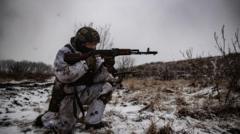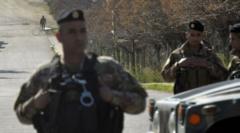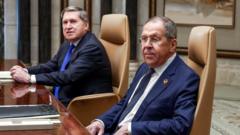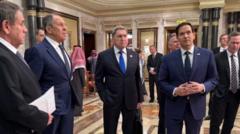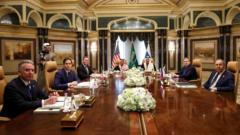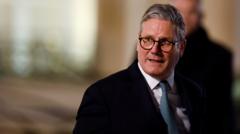As discussions to end the Ukraine war emerge, Ukraine's President Zelensky emphasizes territorial integrity, while Russia seeks recognition of its annexations. The potential for NATO membership remains contentious, representing differing security perspectives of both nations.
Negotiating Peace in Ukraine: The Competing Interests of Key Players

Negotiating Peace in Ukraine: The Competing Interests of Key Players
The Munich Security Conference highlights contrasting visions for Ukraine's future amid renewed peace negotiations led by the US and Russia.
The recent Munich Security Conference (MSC) has showcased the fragmented aspirations surrounding peace negotiations in Ukraine, following a notable phone call between US President Donald Trump and Russian President Vladimir Putin. This call, characterized by Trump as a significant moment with optimistic potential for resolving the ongoing conflict, has stirred varied reactions across Europe and among stakeholders involved in the war.
Ukraine's President Volodymyr Zelensky made it clear that his country must not be omitted from peace discussions. European leaders, including French President Emmanuel Macron, expressed concern that any peace agreement favoring Russian demands may lead to adverse consequences for all parties involved. The specifics of when negotiations will take place remain uncertain, yet discussions will inevitably focus on critical subjects including territorial disputes, security arrangements, and Ukraine’s prospective relationship with NATO.
The landscape of territorial control in Ukraine has dramatically shifted since the conflict's inception in 2014, following the annexation of Crimea by Russia and the emergence of pro-Russian separatists in the eastern regions of Donetsk and Luhansk. Currently, Moscow holds approximately one-fifth of Ukrainian territory. In light of this, Zelensky reaffirmed that any peace resolution must entail the complete withdrawal of Russian forces and the restoration of Ukraine’s pre-2014 borders, which includes Crimea. He stated unequivocally, “We will never recognise occupied territories as Russian,” emphasizing his nation’s commitment to sovereignty.
Conversely, Russia regards its annexation as sanctioned and seeks acknowledgment of the territories it controls, despite ongoing military resistance. In a potential compromise, Zelensky has proposed that Russian-occupied territories could be exchanged for parts of Russia held by Ukraine; however, such suggestions have been swiftly dismissed by the Kremlin.
Historically, Ukraine’s western allies have maintained solidarity with Zelensky’s stance, but recent comments from U.S. Defense Secretary Pete Hegseth have tempered expectations regarding the complete restoration of Ukraine's territorial integrity. Hegseth criticized the pursuit of "illusionary goals" and suggested that they might prolong the conflict, stating, “Chasing this illusion will only prolong the war and cause more suffering.”
Moreover, Ukraine’s aspirations to secure NATO membership remain contentious. Zelensky believes that joining NATO is crucial for national security, particularly in light of Russia's aggression. He argued that NATO membership represents the most effective guarantee against further incursions. Nevertheless, Moscow opposes Ukraine’s NATO ambitions on the grounds that it would threaten its own security by placing Western military resources near its borders.
Zelensky voiced confidence in NATO's existing security guarantees but expressed that full membership would provide the most comprehensive protection. UK Prime Minister Sir Keir Starmer has echoed this sentiment, asserting that Ukraine is on an irreversible path towards NATO membership. However, recent signals from U.S. leadership have led many to question the validity of these assurances, with Hegseth indicating that membership "is not a realistic outcome" of any peace settlement.
The upcoming peace talks are being anticipated with caution, underscoring the critical nature of security arrangements. Zelensky has previously expressed skepticism regarding security guarantees lacking robust U.S. involvement.
As the international community watches closely, key players continue to navigate the treacherous waters of diplomacy, where aspirations for peace grapple with the stark realities of territorial ambition, national security, and historical grievances.



